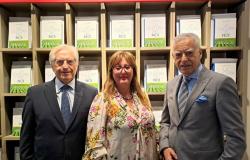A QR code brings to life the “Stupor Mundi”, Emperor Frederick II of Swabia. And it tells about his life and works by borrowing the voice of the actor Massimiliano Gallo. New technologies at the service of historical reconstructions. There is also this in the book that “Repubblica” and the University of Naples have created to celebrate the 800th anniversary of the university. A volume that will be offered as a gift to the newspaper’s readers on 5 June, the very day of the foundation of the Studium which would have given rise to the oldest secular university in Europe. «An important volume – underlines the rector Matteo Lorito when announcing the presentation of the book (on 3 June at 1pm in the university’s Conference Center in via Partenope) – a volume that will remain. Not an ephemeral work, but a contribution intended to contribute, as well as to the reconstruction of our history, to drawing the profile of the university today, through the many testimonies collected here, and of the future we are building”.
The book makes use of contributions that are largely original and in any case not present in print in other publications. Essays by historians, philologists, great popularizers. Any names? The historians Alessandro Barbero and Fulvio Delle Donne, the philologist Roberto Antonelli, the popularizer Alberto Angela. It is they who have explored for us the history of the emperor “Stupor Mundi” and of his longest-lived, and perhaps most revolutionary, creation, the university that bears his name. And which over the course of 8 centuries has trained the ruling class of Southern Italy and the whole of Italy: just think of the three presidents of the Republic who graduated here, of the large number of high magistrates who studied in the classrooms of the Umberto course (he talks about it for example the president emeritus of the Constitutional Court Francesco Casavola), to the great managers and scientists who left Naples for leading global companies, from Apple to NASA.
The volume is edited by the head of the Neapolitan editorial team of “Repubblica” Ottavio Ragone, by the head of the Scuola Superiore Meridionale Arturo De Vivo, by the vice-rector Rita Mastrullo and by the writer. It is 240 pages full of insights and testimonies. There are also students from the various degree courses who spoke for the book about the uncertainties of their first steps at university, the places that have entered their hearts, the obstacles, the dreams, the ambitions for tomorrow. There are testimonies of illustrious graduates for whom Federico II served as a springboard for brilliant careers all over the world. There are artists who have gone beyond the borders of our home and have established themselves on the national and international scene, such as Mario Martone, Luca Miniero and the Oscar winner Paolo Sorrentino, Renzo Arbore, Enzo Decaro and Alessandro Preziosi. And writers of the caliber of Maurizio de Giovanni, Viola Ardone, Francesco Piccolo, Monica Acito, Chiara Valerio. Each in their own way protagonist of a university capable of looking beyond the border and bringing to Naples, for example, the Nobel Peace Prize winner Denis Mukwege, whose pages tell, in our book, his commitment as a surgeon for the women of Congo. Without forgetting that such deep roots generate life and culture and renewal in the territory in which they are planted: in the city that hosts the university in its ancient center and, increasingly often, in its most troubled territories: the suburbs.






